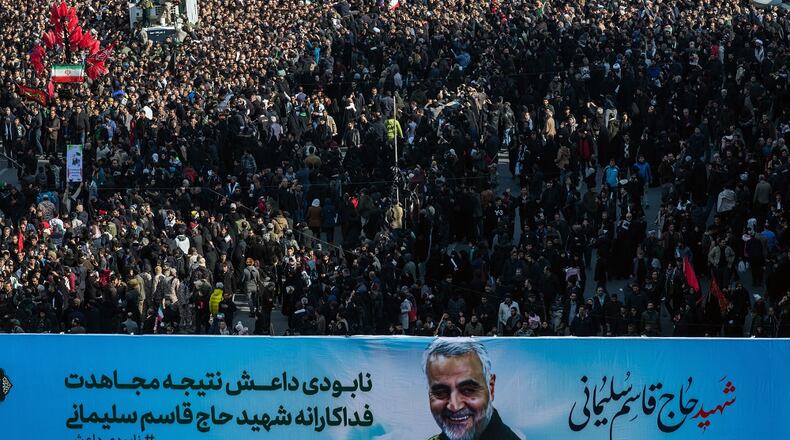President Donald Trump said the killing of Gen. Qassem Soleimani was not an effort to begin a conflict with Iran.
“We took action (on Friday) to stop a war. We did not take action to start a war,” Trump said in Florida over the weekend.
Trump also said he won’t seek regime change in Iran.
RELATED: As tension in Middle East is rises, so too does price of oil
Over the weekend, Iran announced it would abandon the 2015 nuclear deal between itself and world powers.
Bahar Masoudi, who immigrated to the U.S. from Iran with her husband Reza 11 years ago, said many Iranians are happy Soleimani is dead, but hope his death doesn’t lead to conflict.
“Soleimani is responsible for killing many people. His hands are bloody,” Masoudi said. “Most of the people there have a hate against him. They were happy to see what happened to him.”
Masoudi and her husband own a couture dress shop in Oakwood.
Thousands took to the streets in Baghdad on Saturday for the funeral procession of Soleimani, but Masoudi said the people who gathered were government workers or school children forced to attend. The majority of the Iranian people did not like Soleimani, she said.
Masoudi said her family and friends still living in Iran believe most of the trouble in the Middle East is happening because of the Iranian regime.
“I think the basic problem in the Middle East is the Iranian regime,” Masoudi said. “I wish the U.S. could help the Iranian people take down the regime. I wish there was another way, other than to start another war. I’m worried about my friends and family there.”
RELATED: Push to oust US troops from Iraq a risky undertaking
The president tweeted that he would respond to retaliation from Iran by bombing cultural places in the country. Masoudi said that this is something the Iranian government wants.
“(The Iranian regime) wants to get rid of history before Islam came to the country,” Masoudi said. “The people of Iran are very proud of the Persian history. They are worried about these cultural places being bombed.”
Dayton school board member Mohamed Al-Hamdani came to the U.S. from Iraq with his parents when he was 10 years old in 1992. Al-Hamdani said he believes the general “was a bad man who hurt American lives and hurt Middle Eastern lives,” but he isn’t sure how he feels about the air strike.
“The general had caused a lot of issues in the Middle East, including in Iraq, where I’m from,” Al-Hamdani said. “But I don’t know about adding gas to an already smoldering fire. It’s kind of a ‘damned if you do, damned if you don’t’ situation. I don’t envy the people who had to make that decision.”
Both Iran and Iraq were seeing slow, but growing, uprisings from citizens who wanted to see a change in the government, Al-Hamdani said. This air strike has hurt that process.
“The immediate reaction from the Iran and Iraqi governments does not make me feel comfortable,” he said. “I am not in favor of another war in the Middle East. We’re still feeling the affects of the first Iraq war.”
RELATED: Local Iraqi refugee worked with U.S. marines
Both Al-Hamdani and Masoudi said they feel further conflict in the Middle East is not in the best interest of any party involved because of the cost and the potential loss of human life.
“I think entering into another war in the Middle East would be a grave mistake,” Al-Hamdani said. “I hope we take a deep breath before jumping into another war in the Middle East. The decisions are being made in Washington, but they affect everyone.”
About the Author

